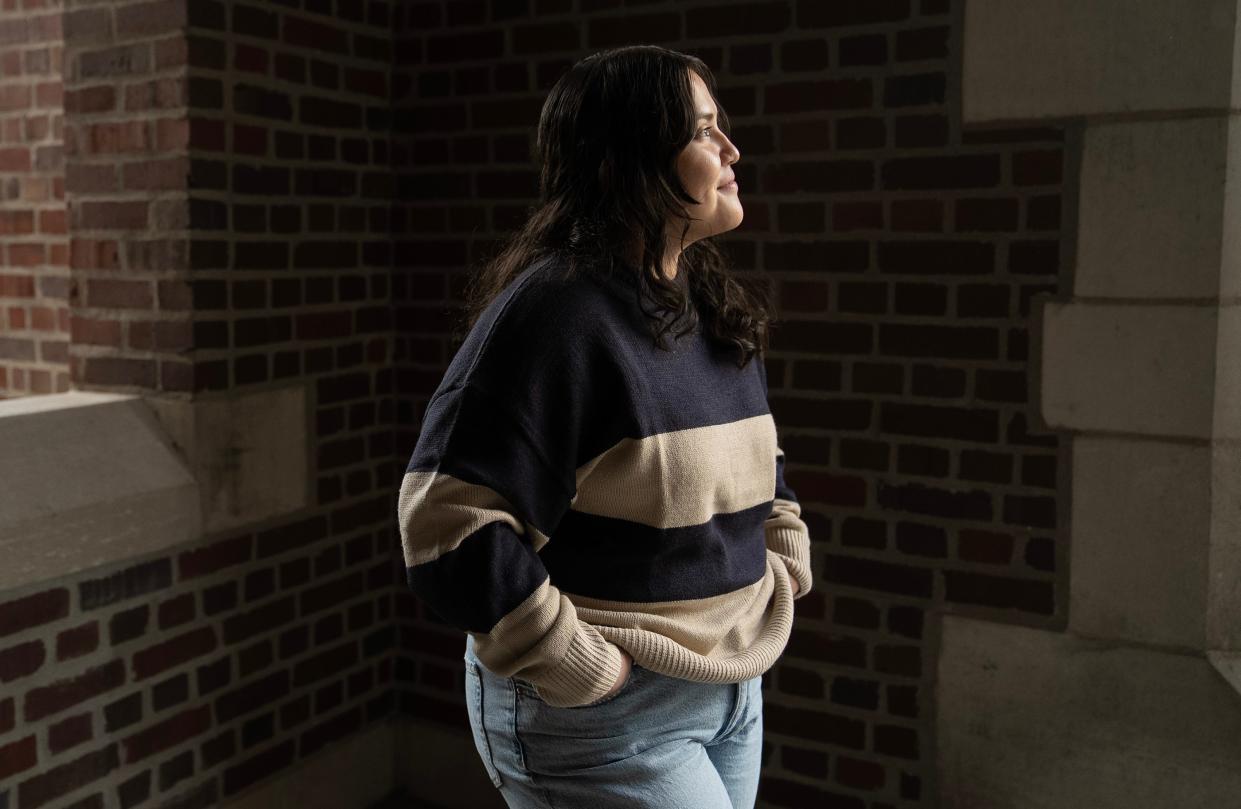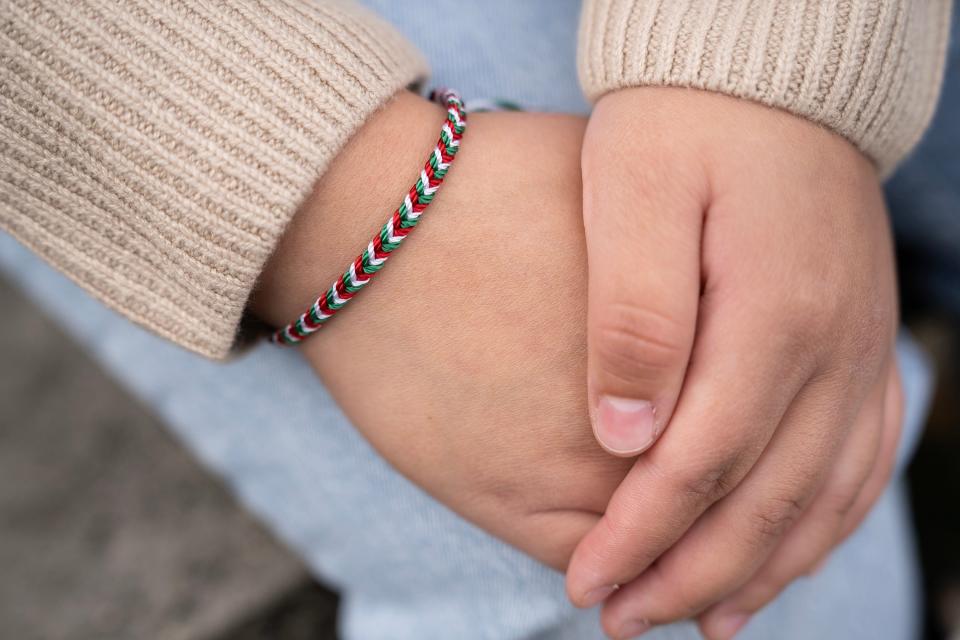From migrant farmworker to pre-med: OSU is a pathway for innovative Florida program

Even though she spent a chunk of her childhood in the Midwest, Nallely Segura, a first-year Ohio State University student, has never seen fall colors — or snow.
“The first time I saw a red leaf, I took a picture and sent it to my mom,” she told The Dispatch.
Segura’s parents, who are migrant farmworkers, raised their children on the move as they followed the growing seasons from state to state. Summers were spent in Indiana picking tomatoes, corn and other vegetables. Winters were passed in the watermelon fields of southern Florida, where the children attended school. Depending on when the summer harvest ended, Segura and her three siblings would enroll several weeks late each year.
A pre-med student, Segura came to OSU through an innovative program in her hometown of Immokalee, Florida, where most students come from farmworker families. Tutor Corps, as it is known, has been run by Immokalee’s nonprofit group, the Guadalupe Center (no connection with the Our Lady of Guadalupe Center on Columbus' West Side), since 2004. It employs high school students to mentor their younger peers while at the same time preparing them for college. In just the past four years, the program has sent about 154 students to campuses across the country, according to staff members.
Sitting on a bench by Ohio State’s Mirror Lake on a chilly October morning, Segura reflected on her journey thus far.
College has been a major adjustment, she said, but “whenever things get difficult here … I just remember where I came from, and where I am now.”
“(The) Guadalupe (Center) is definitely one of the reasons why I'm here,” she added.
Unique challenges for migrant farmworker students
Students from migrant farmworker families face unique challenges, from agriculture-related interruptions to natural disasters and cycles of poverty, according to Guadalupe Center Director Dawn Montecalvo, who spoke to The Dispatch from Florida by phone.
Immokalee is a farming town of around 28,000 residents, where the per-capita income is about one-third of nearby Naples. About three-quarters of residents are Hispanic, one-fifth are Black and 28% of households fall below the poverty line.
“When I first started working with the students in Immokalee, I remember a parent saying they wanted their child ‘to work in air conditioning,’ said Montecalvo. “I thought that they meant they wanted them to be an HVAC technician, but they meant they just wanted them to work indoors …(not) in the fields.”
In the Tutor Corps program, high schoolers are paid to mentor younger students from kindergarten through second grade who are in the bottom quartile of their classes. The high schoolers assist adult teachers to provide after-school reading, math and homework help.
Besides earning a salary, the high schoolers get help from Guadalupe staff members to apply to college and improve their leadership skills. The center also provides each student with a scholarship of up to $16,000, depending on how long they’ve worked, and helps them unlock even more college funding from other sources. The program costs about $2.4 million per year.
Nallely’s cohort of 27 students received around $3 million in total college scholarships to attend campuses across the nation, or nearly $28,000 per student per year, according to Montecalvo. Almost all are going to college debt-free.
“It’s a support system that I didn't know that I needed,” said Segura, whose parents both came to U.S. from Mexico as children. “My parents, as hard working as they are, do not have much insight when it comes to college life or professional careers … simply because we've done agriculture our entire lives.”
Montecalvo noted that Nallely’s peers in Immokalee had experienced devastating hurricanes Irma and Ian, plus COVID while in high school.
“Resiliency is a big thing in our community,” she said. “I think Nallely (Segura) shows that too.”
OSU used to have program for migrant farmworkers
Local experts at OSU and in the nonprofit sector told The Dispatch they were unaware of any current college programs specifically for children of migrant farmworkers in central Ohio.
Approximately 5,600 documented migrant farmworkers are employed in Ohio, according to the Ohio Department of Agriculture, plus many more who are undocumented. (Around half of agricultural workers in the U.S. are undocumented, according to the U.S. Department of Agriculture.) Many migrant farmworkers are located in northwestern Ohio.
Ohio State, a land-grant university, used to participate in the federal College Assistance Migrant Program, which supports students from farmworker backgrounds at campuses across the country. But OSU’s partnership with the program ended more than a decade ago, according to Yolanda Zepeda, the university’s interim vice provost for diversity and inclusion.
Zepeda noted that OSU still provides a variety of services to support Latino students on campus, including a Latine Student Success Center.
Ramona Reyes, who sits on the Columbus Board of Education and directs the local nonprofit Our Lady of Guadalupe Center, came from a Texas-based migrant farmworker family to attend OSU in the 1980s. She said she received a scholarship through from the Campbell’s Foundation at that time, and now manages and fund-raises for her own Avance Escolar scholarship, which provides from $250 to $2000 for local Latino college students.
But she said there are “not a lot” of local opportunities geared specifically toward farmworkers’ children today.
An aspiring pediatrician
Despite coming from a very different background than some of her peers in the Health Sciences Scholars program, Segura said she’s already starting to feel at home at Ohio State.
She wears a bracelet featuring the tricolor of the Mexican flag and recently joined the Mexican Student Association, where she’s found friends who like her Spanish jokes and who listen to the same Bad Bunny songs.

“It’s really helpful just because it is very easy to get lost in such a big campus. … Whenever I go to those meetings, I'm back at home,” she said of the Mexican Student Association.
Segura wants to become a pediatrician, because she loves children and because of the disparities in health care access she witnessed growing up. In Immokalee, the nearest emergency room is nearly 45 minutes away, she said.
She hopes to one day provide health services right in Immokalee.
Remembering that goal “keeps me motivated to stay,” she said. “At the end of the day, all of what I do is for my community.”
Correction: A previous version of this story misspelled Nallely's surname as Seguro. The correct spelling is Segura.
Peter Gill covers immigration, New American communities and religion for the Dispatch in partnership with Report for America. You can support work like his with a tax-deductible donation to Report for America at:bit.ly/3fNsGaZ.
pgill@dispatch.com
This article originally appeared on The Columbus Dispatch: From migrant farmworker to pre-med at OSU
